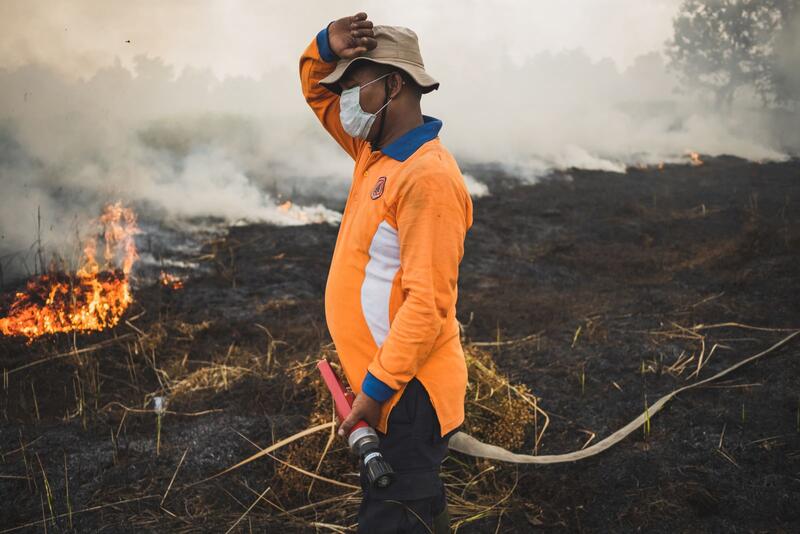
We're pleased to share this abstract from the recent paper, “Public and Religious Values in the Context of Local and Transboundary Haze Pollution in Indonesia” by Alfajri, Azhari Setiawan, Helena Varkkey, Matthew Ashfold, Laura De Pretto, Wong Pui Yi, and Christopher Ives. Go here to read the full paper on the TECSEA site (Transboundary Environmental Commons in Southeast Asia) and find out more.
Haze pollution is a decades-long international environmental problem in Southeast Asia. The 2019 haze captured worldwide attention when photos of a ‘red sky’ in Jambi, Indonesia, was widely circulated. The World Bank estimated that the 2019 fires destroyed an estimated 1.6 million hectares of ecologically valuable land in Indonesia, causing damages of at least USD5.2 billion. The thick smoke from peatland fires travels across national boundaries, at times affecting up to eight ASEAN nations, particularly Malaysia and Singapore. In addition to substantial environmental impact, haze pollution impinges on human health, with recent research estimating that the region-wide haze episode in 2015 caused around 40,000 to 100,000 excess deaths.
While haze pollution has received much attention from fields such as atmospheric, health and political sciences, far less attention has been paid to the importance of deeply held cultural values in shaping public perceptions of the crisis. In their research, Alfajri[1] et al. explored how the Indonesian public relates to the haze. By systematically exploring the intersection between Indonesian society’s deeply-held values, attitudes related to the haze, and religious beliefs, the researchers sought to understand how governance decisions to address fires and haze could accommodate cultural perspectives among key communities.
Their research revealed the potential power of religious values to meaningfully enhance fire and haze reduction efforts across a deeply religious society. Across two focus group discussions (FGD), participants showed low awareness of sustainability labelling or anti-haze labels on consumer products, despite haze-producing fires often being linked to unsustainable agribusiness practices. However, all participants were knowledgeable when it came to checking for ingredients, expirations dates, or halal certification (permissible according to Islamic law). It was in conversations about faith that a unique suggestion was offered to the haze problem: participants suggested that by following the logic that something halal should not bring harm to God’s creation, sustainability should be included as part of the requirements to obtain a halal label. Indeed, halal labelling has been a large part of the Indonesian consumer culture, with the government putting into place a law for mandatory halal labelling on all products in 2019.
The strong religiosity among the FGD participants was also apparent when they shared that God was considered to be the sole source of hope and ‘salvation’ during extremely serious haze, as all human efforts (by governments or corporations) had failed to provide solutions time and again. This belief correlated strongly with earlier survey findings which found that almost 70% of Indonesians increased their religious activities during the haze, for example, with special prayers held for rain.
Throughout the discussions, the important role of religion in almost every aspect of Indonesians’ personal lives remained an underlying thread. Participants’ views seemed to resonate with the Islamic ecological paradigm which incorporates concepts of environmental sustainability, protection, and conservation: the Quran advocates trusteeship of nature, as all of nature is seen as ayat signs of revelation of the divine. With Indonesians being among the most religious in the world, the Islamic ecological paradigm represents an untapped cultural resource that could inform haze policy directions in the country and mobilise action against forest burning. Indeed, this potential was recently demonstrated when the Indonesian Ulema Council issued a fatwa in 2016 that prohibits Muslims from burning peatland on the grounds of Islamic environmental ethics.
The researchers’ findings highlight that any policy approach seeking to influence individual behaviours related to consumer choice or environmental action in Indonesia should meaningfully engage with the public’s religious values for improved outcomes. Policymakers need to engage with multiple stakeholders, including religious actors, in formulating, campaigning and advocating policies related to forest fires and haze.
For more information on this research, see the full article here. The research is supported by the Toyota Foundation Grant Program 2017 through the project “The Southeast Asian haze crisis: Public values as a pathway towards constructive cross-border sentiments and engagement” (D17-R-0421). Similar articles on the other two countries covered under this project, Malaysia and Singapore, are also available. While the project also explored religious values in these countries, religion did not stand out as a particularly powerful or potentially influential value for engagement on haze, reflecting lower levels of religiosity in these societies.
[1] Department of International Relations, Universitas Abdurrab, Riau, Indonesia
